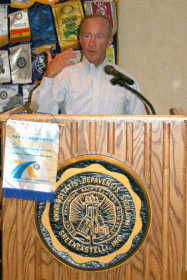Daniels: Thrifty state spending key to surviving recession
GREENCASTLE -- In front of a packed meeting of the Greencastle Rotary Club Wednesday, Gov. Mitch Daniels talked about what has allowed Indiana to fair better than its neighbors during the recent recession.

Daniels emphasized the importance of a tight budget throughout the talk.
"40-odd states have raised taxes during this recession," Daniels said. "It's been our policy not to do that.
"We believe we have been building a position of competitive advantage for investment and new jobs in this state. I don't want to see that weakened."
He also said while most states are adding to their debt, Indiana has reduced its debt by 40 percent in the last five years.
"There are only five states that are thriftier than Indiana on a per capita basis," Daniels said.
Daniels mentioned frustration about the timing of the recession, as it began just as Indiana was gaining acclaim for being among the best places for jobs.
"It was very frustrating that just as we got to the point of recognition the whole economy stopped," Daniels said. "I used to tell people that it felt like being the prettiest girl in school and they call off the prom."
Despite that frustration, Daniels spoke about how a state can try to use a recession to improve its economic positioning.
"Our approach to this recession has been the same one that the best businesses take to a down market; they see an opportunity to gain market share," Daniels said. "If they can handle themselves better than their less efficient or weaker competitor, they can come out of it stronger."
Daniels said by maintaining low taxes and low costs while continuing to build infrastructure and having a simple-to-navigate regulatory structure, Indiana can position itself well by comparison to other states.
"Just as the best businesses separate from their competition, as other states raise taxes or let services crumble, we become a little more competitive each time," Daniels said.
Daniels also talked about how often companies that have to close a plant in one state and keep it in another choose to keep the plant that is in Indiana.
"We're seeing a lot of that in the northeast quadrant, with companies that had a Michigan and Indiana plant or an Ohio and Indiana plant, where they close one plant and bring the work to the other," Daniels said.
Daniels said although the government wasn't involved, John Kass at Buzzi Unicem said it had done the same thing, closing a plant in Illinois and moving the work to Indiana.
He said part of what allowed Indiana to balance its budget in 2010 was conservative fiscal estimation, mentioning that he disagreed with the over $14 billion estimate the legislature had for the incoming for the general fund.
"We cannot wishfully start spending money that is just not going to be there," he said.
Daniels said there was a special session to bring the number closer to $13 billion estimated; the actual number was closer to $12 billion.
"There was a billion dollar gap," Daniels said. "We paid for it about half through additional cuts and half through our reserves that we had insisted on protecting."
Part of what made those reductions possible, Daniels said, was many government agencies "finding ways to maintain services with far less money."
"Even if we meet projections, we will enter the next budget with fewer dollars than the state had in fiscal year 2006," Daniels said. "If you're trying to run a business with a top line that's smaller than it was six years ago, you've done some very difficult things to stay in business, including some things you'd rather not do. We have, too."
While Indiana has rolled back state employees to the level it was at in 1979, Daniels acknowledged some of those jobs are done through private businesses rather than by public employees.
"We have got reductions of 25 percent or more from almost every agency in state government except higher education and K-12 education," he said.
